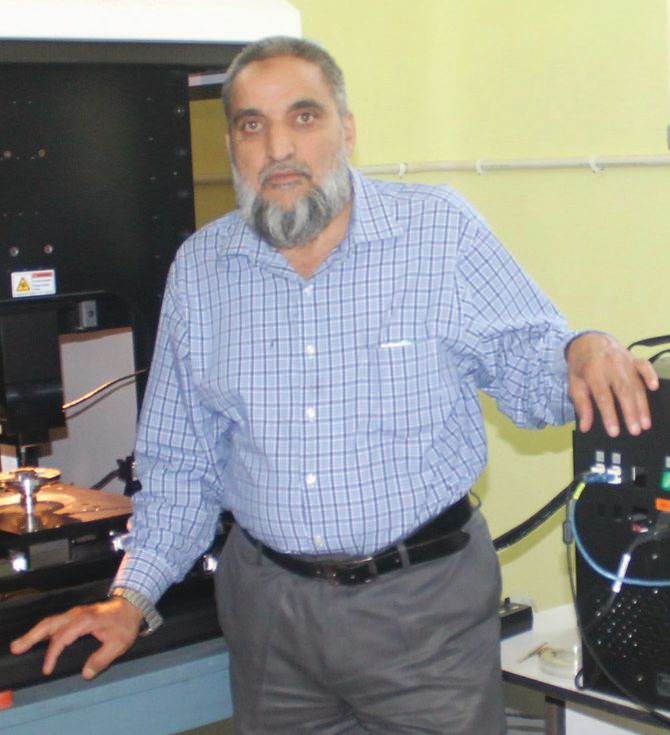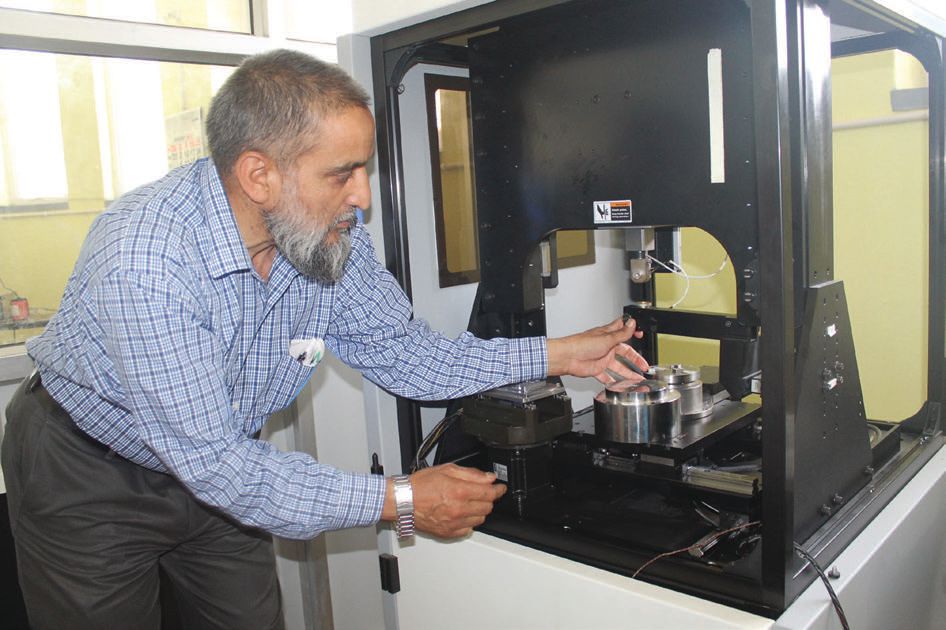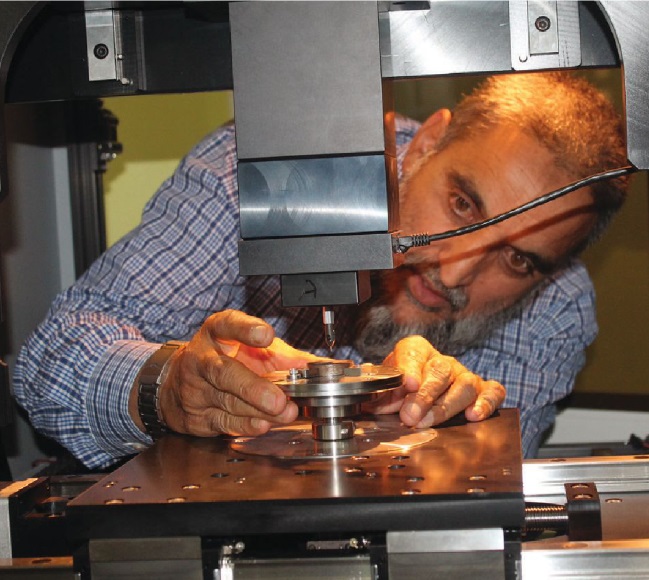20 Minutes With Muhammad Farooq Wani
Rachel Fowler, Associate Editor | TLT 20 Minutes November 2015
Research conducted by this mechanical engineering professor has increased our understanding of wear on ceramics at high temperatures.
MUHAMMAD FAROOQ WANI - The Quick File
Muhammad Farooq Wani is a professor in the mechanical engineering department at the National Institute of Technology (previously known as Regional Engineering College). Born in a remote village of District Kulgam of Kashmir, J&K, India, he has more than 35 years of teaching and research experience in tribology. A renowned tribologist and engineering scientist, Wani was raised in conditions where research wasn’t a priority, making his academic journey even more challenging.
Wani did his primary education in a government school and completed his bachelor’s degree in mechanical engineering from the National Institute of Technology in 1984. He joined the same institute as lecturer in mechanical engineering in September 1985 and completed his master’s and doctorate degrees from Indian Institute of Technology, Delhi, in 1990 and 1999, respectively.

Muhammad Farooq Wani
TLT: What was your contribution at the postgraduate level?
Wani: My research work was in the field of tribological properties of structural ceramics. It involved a pioneer work on non-oxide ceramics such as silicon nitride and its composites of TiC, TiN and sialon. The results obtained from my thesis at the postgraduate level stand published in the Journal of the American Ceramic Society and the CRC Tribology Data Handbook.
TLT: What were your interests at the postgraduate level?
Wani: I joined a course at ITMMEC, IIT Delhi, in industrial tribology and maintenance in 1988. This course fascinated me so much that I started to love learning more and more about the subject of tribology. It was in this course where I was introduced to tribology. I developed an interest in learning more about friction, wear and lubrication and started writing to various researchers and academicians who were working those days in the field of tribology such as Professor Czichos and Professor Duncan Dowson.
I was fortunate enough to get my thesis topic on tribology of structural ceramics. Accordingly, I started my experimental studies on structural ceramics using a high-temperature tribometer at IIT Delhi. I could get significant data on friction, wear and lubrication studies in a short period of six months. Following this thesis, I started focusing on tribological characterization of non-oxide ceramics and their composites.
TLT: What you have contributed to the scientific community at the doctorate level?
Wani: For the first time I introduced the concept of tribology for the design and development of mechanical systems for enhancing their reliability, availability and maintainability at operational stage with minimum effort and cost.
TLT: Which problems so far have given you a tough fight in your research activities?
Wani: Performing experimental friction, wear and lubrication studies on ceramics at a high temperature was a challenge. It took a lot of efforts and energy, but ultimately succeeded with continuous efforts.
 Muhammad Farooq Wani working on his research.
Muhammad Farooq Wani working on his research.
TLT: What is your contribution in developing academics in your institute?
Wani: I evolved the fundamental course on tribology at the undergraduate level in the mechanical engineering department at NIT Srinagar. At the postgraduate level I evolved two courses: Master of Technology in Mechanical System Design and Industrial Tribology and Maintenance Management.
TLT: How has your contribution helped in developing tribology in your institute?
Wani: I developed basic as well as advanced research facilities in the field of tribology at NIT Srinagar. This advanced tribological study centre is equipped with modern scientific sophisticated tribotesters, surface morphological and surface analytical tools. These include the universal tribometer, high-temperature tribometer, nanoindenter, nanotribometer, automatic micro-hardness tester, 3D surface profiler, fretting wear tester, high-temperature reciprocating sliding tester, tri-vector oil analyzer, 4-ball tester, high-resolution automatic microscope, automatic polishing and cutting machines, etc.
TLT: You probably have seen dozens of good students. Who has impressed you the most?
Wani: At the undergraduate and postgraduate level, I have taught many students courses on design and tribology and have guided many research students at the postgraduate and doctorate level. I was highly impressed by one student who was working with me for his thesis work at the postgraduate level. He designed and developed a test pin on disc tribometer for conducting research work on self-lubricating nano-silicon nitride ceramics and its composites.
TLT: In your opinion, what is the future of tribology?
Wani: In the future I would like to contribute further in the research and education of tribology in general and in particular for the tribology of ceramics for engineering applications. One of my future endeavors is to develop materials and lubricants through tribological research for design and development of sustainability products.
TLT: What are your latest achievements as far as the basic experimental research is concerned?
Wani: In the recent past I have conducted experimental studies on various materials and composites at room and high temperature at the micro and nanoscale level. At room temperature I have conducted tests on ZrN nanocoatings using a nanotribometer. In these experimental studies I have used a silicon nitride ball of 1.25 mm diameter against a titanium-modified austenitic stainless steel disc with ZrN nanocoating. These results are quite interesting in understanding the friction and wear of nanocoatings for corrosive environment applications.
 Muhammad Farooq Wani concentrating on his work.
Muhammad Farooq Wani concentrating on his work.
TLT: In your opinion, what are the challenges faced by tribologists to arrive at a solution for problems?
Wani: In my opinion, with the advent of nanotechnology, we need to review and relook into the mechanistic approaches occurring at atomic and molecular levels. In tribological processes, tribochemistry is an area where more attention must be devoted in order to understand the mechanisms of friction, wear and lubrication at a basic level. Molecules can act as big machines and small may do a big work. The concept has to go from giant to small with more effectiveness. However, safety, reproducibility and cost have to be given priority.
TLT: You mentioned starting your career in an atmosphere where perusing research was not a common feature. However, you have crossed many milestones in R&D. How did you feel the difference?
Wani: It is true. When I was looking into my research problems in my institute, I was feeling all alone. But with motivation and persistent efforts, I could develop a place where at least research problems can be pursued and a mechanical engineer can be tailored not only in an engineer but an engineering scientist. Now we have dynamic and vibrant research groups who are involved in different research areas and applications.
You can reach Professor Muhammad Farooq Wani at mfwani@nitsri.net.